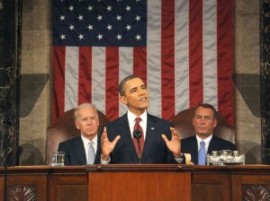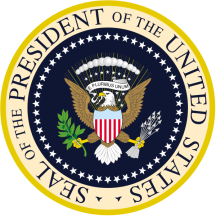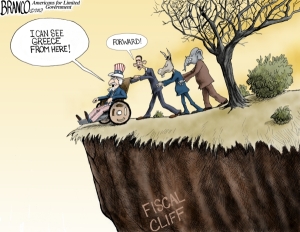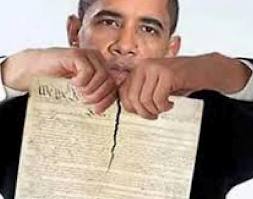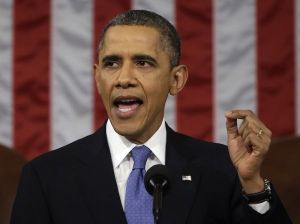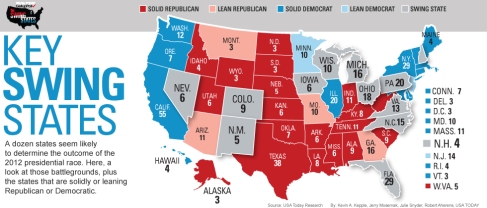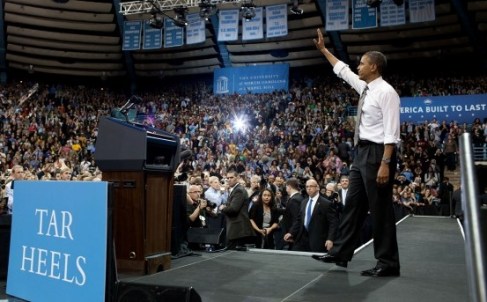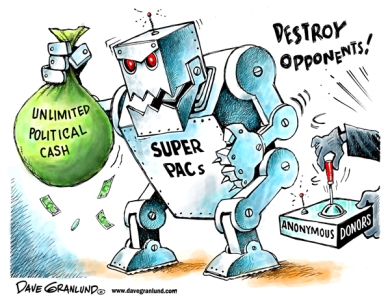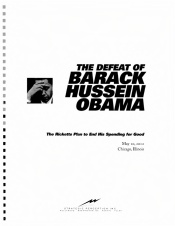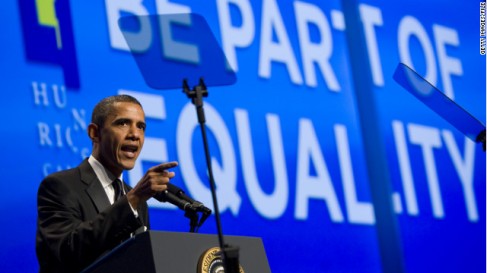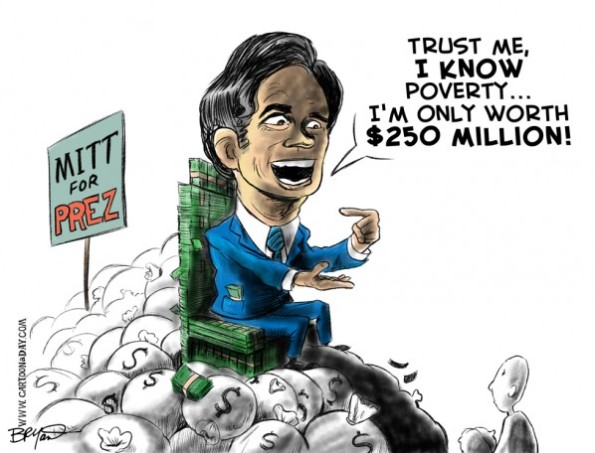Archive
How Safe are Safety Nets?
A fight has recently broken out between the political parties and the issues they are having with Medicare. President Obama has recently opened the floor to negotiate the benefits of Medicare and Social Security.
The controversy with this is the fact that democrats want one things while the republicans want another. The two parties can’t seem to agree on anything. This is also making an issue for Democrats in the 2016 presidential election. “In the midterm races already taking shape, Democrats who back Mr. Obama’s budget proposals to trim future benefits as part of a long-term deficit-reduction compromise could be attacked from the left and the right.”(New York Times).
It has gotten to the point where even liberals and other groups are trying to recruit people to challenge the points they are making. Most of the political warnings to democrats are coming from democrats themselves. Democrats are struggling right now because they do not have any leads for a representative of their party in the 2016 race. The people that they do have don’t have the motivation it takes to run an entire campaign.
Shortly after Obama announced the budget release Ms. Warren said “Our Social Security System is critical to protecting middle-class families, and we cannot allow it to be dismantled inch by inch.” Whoever does run in the 2016 election needs to put Social Security and Medicare at the top of the list for issues to discuss. They will have popularity in the race if they do this.
Medicare and Social Security are two important things that many senior citizens rely on to live a comfortable life. Both of these programs are safety nets. Obama is trying to negotiate the budget on these two programs but he doesn’t see how much some people rely on them. Safety nets help people in unfavorable economic conditions, taking this away will cause serious problems in these peoples lives. The Democrats have realized this and know they must do something in their campaign to change it.
Minimum wage: Raise or Abolish?
 In the passed months , the Obama administration has fought to raise the federal minimum wage above its current level. There are many people who support this and are extremely curious how much longer it will take until it has passed. What has perplexed my interest is what economists have to say about the minimum wage. In my government and economics course we had a brief period discussing over why price floors are destructive to the efficiency of production.
In the passed months , the Obama administration has fought to raise the federal minimum wage above its current level. There are many people who support this and are extremely curious how much longer it will take until it has passed. What has perplexed my interest is what economists have to say about the minimum wage. In my government and economics course we had a brief period discussing over why price floors are destructive to the efficiency of production.
When the government raises price floors. They are intended to increase the money in workers pocketbooks. This in turn gives them more money to be spent elsewhere. Unfortunately, that is not the case, rather than creating a profitable working class it creates one that struggles to find employment. If the price floor is higher than equilibrium, then we find ourselves and excess in supply. Meaning that employers demand less workers because they are at a higher price. In fact, if the Obama administration gets the minimum wage at $9.40, there will be an estimated of 450,000 jobs lost. This will cause a huge hit to our finally stable employment.
 Although it is probably best to keep the minimum wage where it is, there are some who want it gone for good. After all, companies are not just competing for customers, but for employees too. If you are a worker, you will go with the company that offers you the best deal. So in a way, the market also affects wages. Just as I mentioned earlier, if the minimum wage increases, you will most likely see unemployment rise. That is a sign that the market wants labor at a lower price. So naturally workers will accept a lower price so he could be employed. This will push the market back to equilibrium, and have the economy operating at maximum efficiency.
Although it is probably best to keep the minimum wage where it is, there are some who want it gone for good. After all, companies are not just competing for customers, but for employees too. If you are a worker, you will go with the company that offers you the best deal. So in a way, the market also affects wages. Just as I mentioned earlier, if the minimum wage increases, you will most likely see unemployment rise. That is a sign that the market wants labor at a lower price. So naturally workers will accept a lower price so he could be employed. This will push the market back to equilibrium, and have the economy operating at maximum efficiency.
Another way to understand the effect of excess in demand is America’s college situation. We have such a large number of graduates seeking to enroll in college, yet they cannot make it because they are not the most qualified. This has caused ACT and SAT scores to rise astronomically. There are now so many students ready for college that there are not enough students to fill their place. With the standard of admittance rising, the lower income families who cant afford to send their kids to fancier schools so they can get a better chance at admittance. All this happened because there were more students ready for college than spots available.
Our economics course really opened my eyes. I understood the fact that government intervention is best when it is as little as possible, but I never understood why. Perhaps the reason why Obama and most of america wants a higher minimum wage is to give a pat on the back to those who work hard and receive little. But what they don’t understand, is that if they really want to help the workers. They should not raise the minimum wage.
Nuclear Productivity in Israel
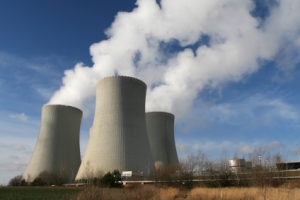 According to CNN, before the president’s first trip to israel, President Obama addressed the israeli government to cease nuclear production or face further isolation from the U.S. President Obama recognized that clearing the past and present disputes is much easier said than done, as well as recognizing the strong mistrust. He goes on to say that it will take quite a long time to fix all things between the two countries. In attempts to gain some of the israeli public Obama stated that their government was detrimental inside the countries border. Obama also was worried about their civilians having all the rights they are deserving of. Obama still searches for a diplomatic solution to the touchy relationship of the two countries. Obama visiting Israel will help the relationship greatly showing an “olive branch” attitude.
According to CNN, before the president’s first trip to israel, President Obama addressed the israeli government to cease nuclear production or face further isolation from the U.S. President Obama recognized that clearing the past and present disputes is much easier said than done, as well as recognizing the strong mistrust. He goes on to say that it will take quite a long time to fix all things between the two countries. In attempts to gain some of the israeli public Obama stated that their government was detrimental inside the countries border. Obama also was worried about their civilians having all the rights they are deserving of. Obama still searches for a diplomatic solution to the touchy relationship of the two countries. Obama visiting Israel will help the relationship greatly showing an “olive branch” attitude.
Obama’s actions indicate that he isn’t intending on having another military conflict. Any new military conflict would cost money that the U.S. doesn’t have. If israel continues nuclear production the threat will increase and thats the last thing Obama wants. He is choosing a diplomatic and peaceful way so that no aggression will be shown. While being peaceful and diplomatic Obama is also criticizing their government saying its detrimental inside its borders. By choosing to present an ultimatum to israel with the “isolation” statement he is sacrificing the relationship with israel.
In this decision to resolve this matter in a peaceful way Obama is giving up his decision to go find the nuclear activity and stop it, this is a trade-off. He trades off having a sure stop to the threat of nuclear production for saving lots of money and being diplomatic. He was also thinking about his marginal benefits by seeing that by being as humble as he could he would get his desired result. This also has a side of opportunity cost because by both options being desirable it makes his diplomatic decision a result of giving up the other costing him that decision.
Exploring the Presidency
This year in government class I learned about the basis of our government through our six units: Civics 101, Foundations, Elections, Presidency, Congress, and Judiciary. I came into class barely knowing anything and was constantly confused when my brother and dad were talking about politics in front of me. Now, I have a greater knowledge of the government and I am able to participate in the various conversations my family has about politics. My favorite unit out of the last two trimesters was the presidency because I enjoyed learning about the specific duties and leadership positions that our president takes on.
Prior to this unit, I did not know the specific powers and duties the president has. All I knew is that he was the leader of our country. But, there is a lot more to the job than just being a leader. In class we explored the powers and limitations of the President through reading Article II of the constitution, Richard Neustadt’s Presidential Power and Clinton Rossiter’s The American Presidency. Article II helped me understand what the President can and cannot do during his presidency. Neustadt’s Presidential Powers discusses the informal powers of the President. Then, The American Presidency explores the modern roles of the President. These three pieces broadened my views on the presidency.
My favorite activity we did during class this year while learning about the presidency was fun with Article II. This made me analyze and take a deeper look into Article II of the Constitution. Instead of just reading through the article and retaining some information I had to closely read what the text is specifically saying. In the activity, we read eight hypothetical solutions and had to find out if they are constitutional or unconstitutional. This helped me explore the constitution in a new way that is more fun than simply reading it. One thing that I found interesting was that the constitution states that the president has to “give to the Congress Information of the State of the Union”(Article II Section 3). While the president always gives the State of the Union address to the nation he does not have to. The president can just give the Congress a letter. The Constitution only states that he has to give the Congress information of the State of the Union not the whole nation.
The next step in exploring the presidency was looking at the modern roles of the president. Rossiter mentions ten presidential roles that the president has. These roles include: Chief Executive, Commander in Chief, World Leader, Chief of State, Chief of Legislator, Chief Diplomat, Protector of the Peace, Voice of the People, Manager of Prosperity, and Chief of Party. Personally I think the most important role of the president is Chief Executive. By reading Rossiter’s The American Presidency, I learned that as Chief Executive the president must choose federal officials, manage national affairs, develop policies, and enforce federal laws and court rulings. These responsibilities of the president especially affect the United States and the citizens. Then, on the other hand, I personally think that the least important role of the president is Chief of Party. While the president is the representative of his party, his commitment as president is not to his party but to his country as a whole. Before reading this piece I did not know about all the roles the president takes on when he comes into office. The president definitely keeps himself busy with all the roles he plays.
The last step in exploring the presidency is looking at his informal powers. Neustadt’s Presidential Power explores the informal powers the president has. In my opinion, the most important informal power Neustadt mentioned was the act to persuade. The president has to persuade people every day that what he is doing is what is best for our country. Persuasion is a big part of being a president and every successful president uses persuasion to prove that everything he does is in the nations best interest.
The presidency was my favorite unit because I explored things I never knew or understood before. Now I know the many different limitations and roles the president has as leader of our country. Overall, government class has taught me a lot about our nation and how it runs, specifically each branch of the government.
Promises of the President
Government in the fir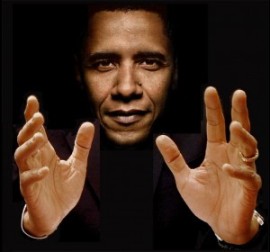 st and second trimesters has been a huge learning step for me. Not only are my eyes so much more open to the political world, but to the world as a whole. Growing up, I never bothered to care about politics, all I knew about the president is he was the man who lived in the White House and the one who always spoke in front of millions of people. Obviously, it is much more than just that.
st and second trimesters has been a huge learning step for me. Not only are my eyes so much more open to the political world, but to the world as a whole. Growing up, I never bothered to care about politics, all I knew about the president is he was the man who lived in the White House and the one who always spoke in front of millions of people. Obviously, it is much more than just that.
As our leader, commander, and voice of our nation, the President of the United States holds many grand responsibilities. As part of being our leader, he must promise to uphold these responsibilities in everything he does. Today, they are known as the 10 Modern Presidential Roles. They are simply the roles that the President must commit to, for example, most elect Chief Diplomat as the most important role. The role of Chief Diplomat is a mixture of having people skills and being involved in international relations. Without international alliances, we are simply one against many. In my opinion, the president to play the role of Chief Diplomat the best was President Jimmy Carter. President Carter attempted to create a diplomatic framework for coexistence and cooperation among the nations of the Middle East. From September 5th to September 17th, 1978, Jimmy Carter met with President Anwar al-Sadat and Prime Minister Menachem Begin of Israel to negotiate a peace settlement. The agreement provided that Egypt would not attack Israel. It also set conditions to bring other Middle East nations to the peace table. This would be considered one of the best examples of a president exemplifying the Chief Diplomat role as it would help create peace in the Middle East. Another role the president must play is the Protector of Peace. As Protector of Peace, the president promises comfort and safety to the citizens of the United States. Obviously, the president can’t protect everyone from disaster, but can issue comfort and aid to the families that are affected. Several examples where Barack Obama exhibits this role is after Hurricane Sandy as well as Hurricane Irene. Obama went and visited the affected, doing a great job during and after the storm. Another example is the 2009 oil spill in the gulf. Obama failed to react quick enough after 11 people died, an awful example of Obama showing he acts as the Protector of Peace. Decided as the least important role of the president is Chief of Party. The overall goal of the Democratic Party is to win elections and the president does his best to assure that no matter the position, the democratic party will win. All he must do is help members of his party get elected as he helps prove the positive in his party. This has absolutely no affect on us, as the citizens of the United States, but more on the democratic party as a whole. The New York Daily News posted a great article on the promises Obama made, yet is unsuccessful in accomplishing most of them.
These three roles aren’t necessarily roles that affect us, as the people, but more as us, our government. Because in the end, if our government is affected, then we will indirectly be affected. You can look at the different roles and determine which is most and least important, but in my opinion, the role of being a good leader and leading us in the right direction is the most important role the president must offer. Out of everything we have learned in class, I have found learning about these roles the most entertaining and eye-opening. A big thank you to Mr. Ostroff, for all the time he takes teaching and showing us the rights from wrongs politically.
Is America Still the Land of The Free?
When America was first created, it was seen as a giant melting pot. A place where anyone could go to and be welcomed with open arms. A place of freedom to do what you pleased when you pleased it. But, America as we know it today is not as welcoming as described in the history books. Although we have over 11 million illegal immigrants who have merely been doing their jobs and not hurting anybody, Americans seem to have this idea that all illegal immigrants are bad and are trying to take down the United States. This reasoning is why congresses’ attempts to make these immigrants citizens have been so controversial. The plan to take these 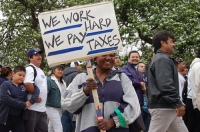 people and make them legal citizens of the US would take time and effort, ensuring these people just truly want to live in the Land of the Free.
people and make them legal citizens of the US would take time and effort, ensuring these people just truly want to live in the Land of the Free.
Right now, in order to become a United States citizen, you must either have been born in the US or had parents who were citizens when you were born. If you do not fit either of these groups, you can apply for citizenship through either “derived” or “acquired” citizenship through parents, or you can apply for naturalization. The naturalization path is usually difficult and requires being interviewed and taking a test on English and on Civics which is composed of US History and Government.To take the naturalization test, you must be a “permanent resident for at least 5 years, be a green card holder, be able to read, write and speak English, be a person of good moral character, attached to the principles or the Constitution of the United States and well disposed to the good order of happiness of the United States during all relevant periods under the law”(US Citizenship and Immigration Services). In other words, you must be a good person and have positive ambitions for living in the United States.
Illegal immigrants in the US are not green card holders, so they are not eligible to become a citizen through naturalization. Now, most citizens think, “Why can’t the government just kick out all these illegal immigrants?” Well, they cannot do this for a variety of reasons. One, if we did so, we would be losing a large percentage of our workforce. And two, we can only deport people who are violating laws. There is no reason to deport a family who is minding their own business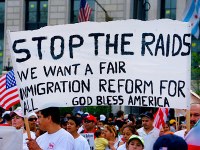 and not hurting anybody. Since they aren’t hurting anyone, why not just make them legal citizens? This is the issue members of congress are dealing with right now. In the attempt to get more than 11 million illegal immigrants their green cards, the White House leaked an immigration bill draft on Sunday, February 17. The leaked plan called for an 8 year process in which the 11 million illegal immigrants could apply for a “Lawful Prospective Immigrant” visa, increased security funding for borders, and expanded E-Verify systems for employers to check employees legal status. This bill was created by all democrats and was widely disputed by republicans. Senator Marco Rubio released a statement saying, “This legislation is half baked and seriously flawed” and that it would be “dead on arrival” if it were to be sent to Congress. This bill could have been the President’s way of saying Congress is moving too slow in figuring out a bill for this. He said in Las Vegas, “if congress is unable to move forward in a timely fashion, I will send up a bill based on my proposal…” It has been released, however that Obamas’ proposal is a “plan B” if the congress cannot come up with its’ own proposal.
and not hurting anybody. Since they aren’t hurting anyone, why not just make them legal citizens? This is the issue members of congress are dealing with right now. In the attempt to get more than 11 million illegal immigrants their green cards, the White House leaked an immigration bill draft on Sunday, February 17. The leaked plan called for an 8 year process in which the 11 million illegal immigrants could apply for a “Lawful Prospective Immigrant” visa, increased security funding for borders, and expanded E-Verify systems for employers to check employees legal status. This bill was created by all democrats and was widely disputed by republicans. Senator Marco Rubio released a statement saying, “This legislation is half baked and seriously flawed” and that it would be “dead on arrival” if it were to be sent to Congress. This bill could have been the President’s way of saying Congress is moving too slow in figuring out a bill for this. He said in Las Vegas, “if congress is unable to move forward in a timely fashion, I will send up a bill based on my proposal…” It has been released, however that Obamas’ proposal is a “plan B” if the congress cannot come up with its’ own proposal.
Illegal immigration has been a big issue in the US for quite a while, and legislators are working hard to solve the issue. While there is a “Gang of Eight” who have dedicated much of their time to solving the issue of illegal immigration and illegal immigrants, they are still not going fast enough for President Obama. The hope is to get a plan by March, but we will see what happens, and how congress decides to deal with the current situation.
Author: GOV_NicoleH
Gun Control: Obama’s Time to Act is Now
Photo Source: News Daily
The two extremes in the gun control debate must find a middle way in order to assuage the heat of the debate. Following the mass murder in Newtown Connecticut, the debate has grown to be volatile. Since the massacre, President Obama has presented his rationale in supporting steps to more controlled gun policies. The President understands that complete gun control is impossible because the Constitution is nearly impenetrable. The second amendment states, “the right to keep and bear Arms shall not be infringed” (Amendment II). A bill that does not violate the second amendment and is still effective requires strenuous work in Congress. As of today, 2,033 people have been murdered by guns since The Newtown tragedy and certain liberal states are becoming impatient, while the republican states are becoming aggravated (Slate). For the President, the time to act on gun control policies is now.
With the majority of Colorado siding towards democratic policies, gun-control bills have already been passed. According to MinnPost, the Centennial State has “hosted to two of the worst gun massacres in recent years” and is now seeking action against guns. The Colorado House of Representatives passed four bills on February 28, 2013 that will limit gun ownership in Colorado: “ammunition magazines limited to 15 rounds; a requirement for background checks for all gun transactions; a requirement that gun purchasers pay for their own background checks; and a ban on concealed guns in stadiums and on college campuses” (MinnPost). The Senate, who is mostly democratic to a lesser degree than Colorado, has not yet voted upon these four policies. The President has proposed similar gun legislation in his State of the Union of “an assault weapons ban, background checks and restrictions on high-capacity ammunition magazines” (Fox News). If passed, those on the side of gun control will have won a battle, but not necessarily the war. If one of the policies were to violate the constitution, federal law would trump state law and the policy would be declared impossible. While some states have leaned toward gun control, others are taking the exact opposite approach.
Missouri, a southern conservative state, has a few extremists who want to take action towards banning gun control protests. Though

Photo Source: NY Times
this law is practically assured denial, a “Missouri lawmaker is proposing to send colleagues to prison for introducing gun control legislation” (Fox News). It is not the attempt of lawmaking that is important, but rather the point that Missouri will not tolerate gun control. In fact, every attempt to create a bill has an equal and opposite reaction. Missouri’s “Republican-led Legislature has taken a different approach — more guns, not less.” One Senate committee is even trying to broaden the gun laws by declaring the right to bear arms “unalienable.” The policy would reflect the Constitution’s Preamble, however would no make much sense. The founding fathers did not consider the right to bear arms unalienable. If they did, the second amendment would not be necessary. I do not think a law to extend the rights of gun owners would be beneficial to the morality of America. However, the increase in weaponry could alleviate the Federal deficit. A country that prioritizes its economy over its integrity is a country doomed for failure.
The President has laid out his plans for America’s gun legislation, now it is up to Congress to decide the extent of the power of a bill that is to be passed, or any at all. There will always be tension between those for and against guns, but the only fair way to act is to find a median that minimizes opposition. The two extremes’ propositions are practically impossible to pass in America today. Thus, the only resolution to such a complex problem is through negotiation and acceptance by both sides through warranting leeway for the greater good of the USA.
Obama Violates the Constitution
On January 4, 2012 Obama appointed three members of the National Labor Relations
Board while the Senate was on vacation for the holidays. This allowed him, in theory, to make the appointments without having the Senate’s approval. The Republicans argued that this was a violation of the Constitution because they weren’t really recessed; they held Pro-Forma sessions every other day. Pro-Forma sessions are when the Senate or another governmental body holds a very short period in session in order to avoid letting a president make recess appointments. On January 25, 2013 news reports stated that the US Court of Appeals for the D.C Circuit had ruled that the appointments that Obama had made were a violation of the Constitution.
The court defined a recess as “only during the breaks between formal year-long sessions of congress, not just any informal break when law makers leave town.” When Obama made his appointments, the Senate was on extended holiday break only and this, according to the Constitution, did not qualify as an opportunity to make recess appointments. Furthermore, “the president can bypass the Senate only when administration vacancies occur during a recess.” The vacancies on the labor board that Obama filled had been open for months before he chose to fill them leading me to assume that he waited to do this only to avoid any input from the Senate.
The Constitution was written to create a framework for the United States. As we have discussed in class, the Constitution allows for an Executive, Legislative and Judicial Branch. The Constitution specifies how laws should be passed, how appointments should be made and how courts should be run. Interpreting the constitution in such a way as to manipulate the meaning so that it benefits only the party in power directly contradicts the intent of the Constitution.
The checks and balances created by the Constitution are something that should not be ignored. Republican’s and Democrat’s views have become so extremely different that the checks and balances system has blocked much of anything being accomplished but it is still an integral part of the Constitution. No one seems willing to compromise and the opposing party refuses to approve their policies. Obama’s response to this was to manipulate the system so that his choices would not be subject to the approval of the Senate. As said by Chief Judge David Sentelle, “allowing the president to define the scope of his own appointment power would eviscerate the Constitution’s separation of powers.” Other presidents have used the same tactics to appoint their own choices to vacancies, but the practice has evolved to such a degree that our leadership is straying from the original intent of the constitution.
If we want to remain a Democratic society, we need to observe what the intentions of the Constitution were when it was written. The constitution created a back up plan for when vacancies occurred and a Senate was not available to approve the appointment. Obama used the back up plan to avoid following what the Constitution intended, almost as if he wanted sole power like a dictator. If this ruling stands, more than 600 board decisions over just the past year could be invalidated. Isn’t it time that we go back and read the Constitution and consider how this country was founded in the first place? Looking for loopholes in the Constitution is not how we should run the country!
Taking the Power to Persuade Too Far
We have studied in our Government class the powers of the Presidency. The modern presidency requires use of different powers that are not outlined in the Constitution. He uses this power while in office communicating to Congress and the House, but he also needs to use it while communicating to the public. The President must use the Power to Persuade in order to gain the support of the American people. During speeches, addresses and debates he has to appeal to the public’s needs. With his power to persuade he is able to rally and gain voters and supporters. Although I understand it is necessary to do as much as you can to please voters, I do not think stretching the truth should be an option.
The President has to appeal to his supporters and the majority of the citizens in the US. With that, there is a chance that he may stretch the truth in order to please the majority. Sometimes, “The president sets soaring expectations, but doesn’t meet them. His broken promises, failed veto threats, and reversals…” (Chandler). Not only can a President promise things that will not happen, but he also can exaggerate or even say the wrong thing in front of the whole United States.
Regarding my topic I wanted to find parts of Obama’s 2013 State of the Union Address where his words, facts, and numbers were not completely right. As I read through two articles [Washington Post and Fox News] I noticed that even the smallest change in words can alter the whole context of what the public hears. There are many cases where President Obama does not say what is actually correct because he phrases his speeches, debates and addresses in wrong context.
For the first example fact Obama states in his address he mentions jobs. Obama says, “After years of grueling recession, our businesses have created over 6 million new jobs.”
Obama is generally telling the truth but he counts the number of new jobs from the point in his first term when job losses were at their highest. He ignores the around 5 million job losses up to his first term. With regard to other factors and elements he technically had an increase of 1.2 million jobs.
Next, Obama states that, “We have doubled the distance our cars will go on a gallon of gas.”
The drastic assumption that Obama makes is not right. We are not even close to doubling the distance we go on a gallon of gas. The deal that the Obama Administration made with automakers will create an average fuel economy of 54.5 miles per gallon by 2025. So, Obama is definitely stretching the truth in this statement.
Obama also says that, “We buy … less foreign oil than we have in 20 [years].”
There really is nothing that relates the decline of foreign oil consumption to Obama’s presidency. If anything the decline started 2 years before Obama’s presidency. To show the decline Bloomberg says, “In 2011, the U.S. relied on imports for 44.8 percent of its petroleum consumption, down from 60.3 percent in 2005, according to EIA data.”
The United State’s citizens listen and learn from what the President says and promises. I feel it is the job of the President to provide facts, numbers and statements that are true to the entire United States. How can we grow as a nation when we are not given the correct information from our own leader? US citizens are becoming less informed and interested in government and Andrew Romano says, “Most experts agree that the relative complexity of the U.S. political system makes it hard for Americans to keep up.” Citizens definitely do not have to know everything about government and the system but they need to be informed about the state of the US and what challenges we are facing. Because the President is a main source of information it is necessary that the info he says is accurate and reliable. Pleasing the public with what they want to hear does not help the United States as a whole and can cause confusion and agreement to decisions that can harm us as a nation.
When President Obama is addressing the United States’ Citizens, should he please the people by saying the things they want to hear or should he stick to the cold hard facts. Obviously he has to persuade voters by saying the things people want to hear, but does that hurt the US as a whole? Is it the job of US citizens to know about all the topics that the President talks about and decipher when he is not exactly telling the truth or says something wrong? Overall, I definitely think the needed use of persuading the public and voters can cause a skew in the line of fact and truth being told the public.
Sequester: Here We Go Again…
A repeat of the fiscal cliff is dawning upon us. By the first of March, $85 billion will have to automatically be cut. Known as the sequester, these cuts will mainly affect federal workers. An approximate 800,000 workers are to expected to face 22 unpaid days, spread out, but end up being very close to about 20% in pay cuts. Congress needs to make a solution to the problem they already created. This solution must not hurt the economy in anyway. From the executive branch, POTUS is still pushing for a combination of tax increases on the rich and increase in spending cuts. It is now Congress’s turn. Congress must either choose raising taxes or increase spending cuts. As Secretary of State John F. Kerry stated, the “price of abandoning our global efforts would be exorbitant.” He means that if the government were to continue with spending cuts, then we would lose a lot of money that were meant for monitoring terrorist activity in Afghanistan and Pakistan. This is even more important because of the “recent rise of Al Qaeda-linked militancy in North Africa.” This is why Congress and the President can not even consider of allowing the sequester to occur.
The United States needs these government programs to protect our citizens. The solution must be based on the middle class. Assuming that this solution will not make anyone happy, politicians must look at the benefits versus the costs. Congress must find a way to pull large amounts of money from the 1% of Americans and from large corporations and put that sum back into the middle class. The obvious solution is to raise taxes on the rich. However, after the fiscal cliff, raising taxes on the rich couldn’t even solve the budget crisis for one year. In his State of the Union address, President Obama stated that he wants to push the minimum wage to $9.00. This is a very necessary step to put more money into the pockets of the middle class and reduce the incomes of monopolistic companies. These are actions that Congress and the President could take to help rise the middle class without imposing spending cuts.
A Time to Lead

Source: Politico
Gun violence, and the movement for gun control and how it relates to the 2nd Amendment of the Constitution has been a simmering issue in our country for decades. It was not until the tragic school shootings in Newtown, Connecticut that this issue received an emotional burst and was thrust back into the national debate. There is no doubt our country’s divided political ideology prevents most from taking an objective approach to the complicated problem of gun violence. I believe our Nation’s culture needs to change in order to solve this problem and, from what I have learned in our Government and Economics class; sometimes it takes a true leader to break through the national political scene to make positive changes for the future of our country.
The mere fact that the Newtown shootings sparked the gun control debate, enflamed gun rights and 2nd Amendment advocates as they believe the more liberal gun control advocates politicized this tragedy. As a means to push for tighter gun restrictions, the American public may be more vulnerable and quick to get behind a so-called solution that would only cause people to “feel better” but yield no meaningful results.
Parties from both side of the gun control debate cite compelling statistics often times taken out of context to bolster their respective arguments. According to factcheck.org gun murders are at their lowest rate since 1981, gun aggravated assault are at the lowest rate since 2004, gun robbery is at the lowest rate since 2004, non-fatal gun injuries are at the highest rate since 2008 and gun suicides are at the highest rate since 1998. What do these figures mean? How does gun violence in our country related to other countries? Regardless of what statistics are used or how they used, it seems evident that both sides of the debate refuse to think more broadly in an effort to make our country less violent while protecting our Constitution. Does gun violence alone account for the violent crimes in our society? Is anyone interested in how we care for the mentally disabled, how we embrace the violent nature of our movies and video games, how parents have lost control of their children? Are our problems related to broken families, poverty, ethnicity, and people unwilling to be held accountable for their own actions, people who do not value human life. Where is our leader?
Great leaders present a vision and develop a compelling reason to change the culture of a Nation. Our President had the opportunity to show the Nation and world he has the characteristics of a great leader during his recent State of the Union Address. He had the opportunity to begin to change our Nation’s culture by outlining his vision for widespread change with regard to violence in our country. He had the opportunity to compel people to collectively begin answering the many questions posed above. He had the opportunity to transform the gun violence issue from that of a purely political matter to a problem that only Americans could solve, not a single political party. Unfortunately our President missed that opportunity and chose to take the easy way out: to be a politician. When President Barack Obama gives his State of the Union address on Tuesday night, “gun violence will be center stage, both literally and politically” (Bresnahan and Gibson). He invited several victims of gun violence to be his guest during his speech. He then framed the portion of his speech that addressed gun violence by saying “Of course, what I’ve said tonight matters little if we don’t come together to protect our most precious resource – our children. “ He then went on to use the victims of gun violence to call for a vote from Congress to pass certain measures related to gun control. He named certain victims and events, then, in a campaign chant meant to evoke applause from his political party, repeated that each victim “deserved a vote”. The obvious ploy was to gain popularity for his gun control plan (his party’s gun control plan). As usual, “Obama’s remarks were short on evidence that his gun control proposals would work.” His evidence mainly was “sorely lacking” (Carlson).
One of the cornerstones of the success of our country is based on the debate of differing opinions, in an effort to compromise, gain consensus and develop laws and policies that are best suited for most Americans. How we act as a people, our culture and values cannot be negotiated in the political process. We need to be inspired to act better, do better, live better and treat each other with more respect. Our President missed an opportunity to be impactful and the American people will most likely be the victims of such inaction.
Will America Adopt the New Gun Control Proposal?
Gun control conversation hit a all time high last year after the Aurora movie theatre shootings, but like most intriguing media news today, the talk seemed to die down within months. Recently however, the Sandy Hook shooting has sent the gun control to a higher level than we, as American citizens, could ever imagine.
The Obama administration essentially used this tragic event as a gateway event to take executive orders on gun control. As this article states, “President Obama will propose an assault weapons ban and better background checks for gun buyers on Wednesday as part of a package of proposals to curb gun violence once month after the Newtown massacre.” On January 16th, 2013, Obama announced 23 executive orders on gun control. Among the more controversial orders were the ban on “military-style” guns, and large magazines. Though a stronger background check was by far least provocative proposal. His actions show clearly his Presidential Powers according to the constitution; Article 2 Section 1 Clause 1 states, “The executive Power shall be vested in President of the United States of America.”
Obviously, Obama’s actions have heated the gun control debate. Gun enthusiasts are livid. They are completely against this executive order, and they are nervous that this proposal will be passed. This is seen evident by the fact that assault rifles are selling out everywhere. On Cheaper Than Dirt, the countries largest online gun distributer, every single type of assault rifle in sold out. Gun lobbyists, such as the NRA (National Rifle Association) have decided to act out against the current administration. They argue that the second amendment specifically states that the citizens of the United States have the right to bear arms, and banning assault rifles is unconstitutional. As the NRA has recently released a new proposal against gun control, they state that Obama has as well recently proposed that every person that buy a gun must register that gun with the federal government, as well as any guns previously owned. The NRA and other gun lobbyist argue that this too is unconstitutional and a complete violation of the right to privacy and the right to protect one’s self (Amendment 4). The right to bear arms and the right to protect oneself were written in order to protect yourself against an over powerful government, and it says a lot that the Obama administration is trying to constrain this right.
On the other hand, pro gun control advocates argue that a band on assault rifles is necessary to protect this country. They argue that how could you neglect the recent shootings (Aurora and Newtown), and not do anything? These advocates defend their stance by claiming that it is our country’s leader’s jobs to protect American, and President Obama would not be carrying out his duties as President if he did not act on these incidents. Supporters debate that it is more important to protect the people of America than protect the gun industry. The 14th Amendment describes each individual’s equal protection. Just as the pro-gun advocates say that the government is violating their right to bear arms, the pro-gun control advocates argue that the government is violating the constitutional right of American citizens by neglecting to protect them.
So who is right?
While both sides have strong supporting arguments, I personally believe that the gun lobbyists, such as the NRA, are fighting an unwinnable battle. Unfortunately for them, it is almost impossible to ignore the facts of these horrible accidents. While long-term plans may be underway to prevent such incidents such as mental health awareness, a ban on assault rifles is a short-term solution that seems inevitable. As New York has already passed new gun laws, it looks as if a nationwide ban on assault rifles will soon be proceeding.
Swing States: The Deciding Factors in Elections
With the upcoming election, it is very fitting to be studying the mechanics and workings of elections and the presidency in government class this trimester. I recently found an article that discusses Obama’s support of same-sex marriage and the effects that his support on the issue has on swing states. Swing states are vital in Presidential elections because in many cases, they ultimately determine the outcome of the race. This recent news and the start of Obama campaigning brings me back to our study in the elections unit, specifically on electoral strategy.
The process to get elected President is a complex and complicated procedure that requires the strategy and assistance of many. President Obama must decide where to focus his campaigning, what issues to focus on, and what audience to target. Ultimately, it comes down to campaigning in swing states that will determine the outcome of the election. Swing states are states that are not solid Republican states nor solid Democrat states. They are states that have not consistently voted one party over the years, but rather, have switched parties throughout the year. Candidates, therefore, have a better chance in persuading swing states to vote for them.
In order to fully understand the electoral strategy and the importance of swing states, we must first look further into the Electoral College. The Electoral College is the system used in the United States to select the President and Vice president. In this system, electors are chosen to represent each state and political party and vote on the presidency. The presidential candidate must win the majority of electoral votes in a state in order to win that entire state. This is not a popular vote where every vote counts. In the Electoral College, it is a “winner takes all” method, where even though the vote may be just about equal among the candidates, the majority wins the entire state, disregarding all the other votes. This explains the significance of swing states. In such states, the support for a particular political party is about evenly split, allowing each candidate the opportunity to win over enough votes to pull through and win the state. Candidates campaign aggressively in these states because every vote counts, and a couple of votes could win them the entire state.
Many factors are taken into consideration when determining how to best capture the votes of swing states. In the article, the author discusses the effect Obama’s decision to openly support gay marriage will have on swing states, and if it will help or hurt his chance of winning them over. The author identifies 11 swing states. He proposes that Obama has a good chance of losing North Carolina to the Republican’s due to the recent pass of banning gay marriage in North Carolina, and Obama’s support of gay-marriage. About 60% of people in North Carolina oppose gay marriage. Florida and Ohio also pose as potential threats to Obama on the issue of same-sex marriage. Obama’s support over this issue will draw support from some, and opposition from others. I believe that his decision will have a large influence on swing states. As these present threats to his success in re-election, he has begun working to win over supporters.
Obama has already begun campaigning for re-election. Through his visits, one can see how the electoral strategy and swing votes influence his campaigning techniques. He has been making special visits to college campuses in swing states. For example, Obama has visited the University of North Carolina at Chapel Hill, the University of Colorado, and University of Iowa, all three of which are swing states. I found that very interesting and smart of him, because a large percentage of support in the 2008 election came from young voters. By visiting those schools he is targeting those young perspective voters. Some states are predictable and unchangeable, yet others could decide the outcome of the election.
Many people feel that the extended attention on swing states is unfair to all the other states that would like to be equally informed and have the same exposure to candidates. What do you think about candidate’s special attention on swing states?
Support for Romney and His Money
In April president Obama Raised 43.6 million dollars for his campaign, which vastly out numbers the amount Romney raised for his campaign. One thing Romney did receive the former president’s approval and has endorsed which will change the way this election goes.
 In our Government Class we’ve discussed the importance money in how successful someone is in the elections. Obama has superior amounts of money compared to Romney, but he may be gaining a surplus of money due to the endorsement by Bush.
In our Government Class we’ve discussed the importance money in how successful someone is in the elections. Obama has superior amounts of money compared to Romney, but he may be gaining a surplus of money due to the endorsement by Bush.
Currently Obama is leading the race to the presidency by a large margin. Both George Bush and his wife Barbra currently support Romney. The more support he has from larger political face, the more he may be able to raise for his campaign. The more money he has the greater chance he has for beating out Obama and take over the presidency. It is said that if Romney could do so, he would be the richest man ever to live in the White House.
Being a reelection year for Obama, many will say that he can’t be beaten. Money is actually one of, if not the most, important factor in determining who will turn out successful. As of now Mitt Romney has raised a total of $86,631,381, in comparison to Obama who has raised a total of $191,671,860. Obama has not only doubled Romney’s number, but is also close to doubling his predicted vote.
 With the help of Bush’s support, Romney could possibly sway all the swing voters and influence them that he is an accountable candidate. With the support of Bush’s followers he will have a greater opportunity to raise more money, giving him more of a shot of defeating Barack Obama, and become closer to him in his total earnings. With more money to spend he will have more advertisement options with more efficient techniques that will hopefully sway the undecided voters towards him if he would like to be president.
With the help of Bush’s support, Romney could possibly sway all the swing voters and influence them that he is an accountable candidate. With the support of Bush’s followers he will have a greater opportunity to raise more money, giving him more of a shot of defeating Barack Obama, and become closer to him in his total earnings. With more money to spend he will have more advertisement options with more efficient techniques that will hopefully sway the undecided voters towards him if he would like to be president.
Obama’s Support of Equal Marriage Equals Support in the Polls
 Earlier this week, Obama announced his support of gay marriage. This announcement should help Obama in the upcoming 2012 Presidential elections. More than half of Americans support legal gay marriage, a big jump from a mere 27% in 1997. 65% of Democrats believe in same sex marriage and over half of Independents. Only 22% of Republicans believe in same sex marriage, but the Obama administration won’t have to worry about the Republican-affiliated Americans, since they most likely wouldn’t vote for a Democratic candidate in the first place.
Earlier this week, Obama announced his support of gay marriage. This announcement should help Obama in the upcoming 2012 Presidential elections. More than half of Americans support legal gay marriage, a big jump from a mere 27% in 1997. 65% of Democrats believe in same sex marriage and over half of Independents. Only 22% of Republicans believe in same sex marriage, but the Obama administration won’t have to worry about the Republican-affiliated Americans, since they most likely wouldn’t vote for a Democratic candidate in the first place.
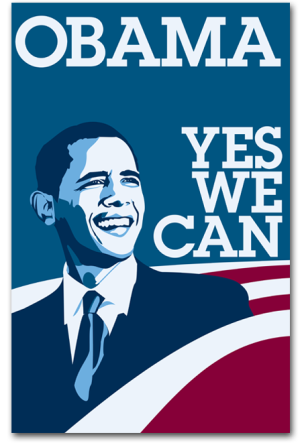 Obama doesn’t need to worry about the vote from the Democratic-affiliated, but should to focus his attention on the Independents in America. Since over half of people who identify as Independent believe in gay rights, announcing his support of gay marriage was a wise announcement made by Obama. The votes of the Independents can make the difference of a win or lost in the swing states during the Presidential Election. More Americans than ever identify as Independents. The problem with identifying as a Independent is that their votes may tip the balance is some states more than others. Obama most likely will not win big Republican states such as Utah, Idaho, or Wyoming. However, the swing states are the real battle-grounds (Colorado, Florida, Iowa, Michigan, Nevada, New Hampshire, New Mexico, North Carolina, Ohio, Pennsylvania, Virginia and Wisconsin). The fact that Obama is trying to unify the vote of these Independent voters is a big step to be re-elected to President.
Obama doesn’t need to worry about the vote from the Democratic-affiliated, but should to focus his attention on the Independents in America. Since over half of people who identify as Independent believe in gay rights, announcing his support of gay marriage was a wise announcement made by Obama. The votes of the Independents can make the difference of a win or lost in the swing states during the Presidential Election. More Americans than ever identify as Independents. The problem with identifying as a Independent is that their votes may tip the balance is some states more than others. Obama most likely will not win big Republican states such as Utah, Idaho, or Wyoming. However, the swing states are the real battle-grounds (Colorado, Florida, Iowa, Michigan, Nevada, New Hampshire, New Mexico, North Carolina, Ohio, Pennsylvania, Virginia and Wisconsin). The fact that Obama is trying to unify the vote of these Independent voters is a big step to be re-elected to President.
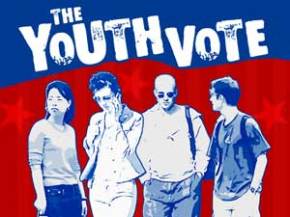 35% of Young voters consider themselves Democrats, 26% as Republicans, and 29% as Independents. As a whole, younger people tend to support same-sex marriage by a considerably larger margin than older voters.The young voters (18-29) voted 67 percent for Proposition 8. Young voters are more ethnically diverse than any other age group. 62% identify as white; in the turn of the millennium, 74% identified as white. In 2008, Obama captured 66% of the youth vote, compared to McCain’s 31% of youth vote. Since youth voters are more supportive to same sex marriage, Obama has more of an upper hand after announcing his support for gay marriage.
35% of Young voters consider themselves Democrats, 26% as Republicans, and 29% as Independents. As a whole, younger people tend to support same-sex marriage by a considerably larger margin than older voters.The young voters (18-29) voted 67 percent for Proposition 8. Young voters are more ethnically diverse than any other age group. 62% identify as white; in the turn of the millennium, 74% identified as white. In 2008, Obama captured 66% of the youth vote, compared to McCain’s 31% of youth vote. Since youth voters are more supportive to same sex marriage, Obama has more of an upper hand after announcing his support for gay marriage.
Campaigning: A Race to See Who Is…. Not the Worst?
As we wrap up the year in our government class, we aim to apply the things we have learned to real life situations. One topic we studied as campaigning and campaign strategies. One could look at Reagan, Bush, JFK, or any of our former presidents for that matter, and he or she could see the use of campaign ads or anything to push his campaign over another’s. The presidential elections are getting nearer and nearer which means that more and more campaign ads and other pushes to get a vote are being used. Recently, President Obama released a short clip slamming Mitt Romney in regard to job losses in the past and Romney’s “plan” for the future. As I talked about (as well as many others) in my last blog post, media has a tremendous effect on the presidential race today because of how many people see it. This ad portrays a dark and solemn tone to represent a not-so-bright future under Romney. Because of what we have studied in our class time, I now have a more solid viewpoint on what this ad really means and what it actually does in regard to President Obama’s campaign. Honestly, if I was to be watching TV in the past and this clip came on, I probably would have done one of two things: either change the channel or just zone out completely for a little bit until it was over. Now, I can actually watch it, know what they’re talking about, and form my own opinion about it, which in this case, I see that President Obama is right when criticizing Romney.

Because of the influence that politicians have on voters, they can say so many things about themselves or other candidates to get people to vote for them.
Moreover, back to the campaign ad and its relevance, this isn’t all that the President, or Mitt Romney even, have done to criticize one another. President Obama has ads like the one about steel workers above, as well as videos like “When Mitt Romney Came To Town”, while at the same time, Crossroads Generation, an organization that supports Mitt Romney, recently released a video criticizing President Obama and the issue of student debt. Things are getting heated. Debate is starting. Every four years, this point in time is reached where it turns into a free-for-all and the candidates throw jabs and sometimes uppercuts at each other. This is that point in time. With all the possible ways to get under candidates’ skin and blast them, it turns into a criticism-fest. As if the campaign ads weren’t enough, the Obama administration made a website solely to poke at Romney in relation to his responsibility for job losses. All of these forms of campaigning are used to cause mass flow of information to voters so that they have everything at their disposure. All of this can be linked to Richard Neustadt’s claim of presidential persuasion. A president must persuade those in his cabinet, but that is once he is in office. A presidential candidate and his or her administration must not only dig up information on other candidates that would shoot him or her down, but they must also be able to persuade their audience in order to get their votes.

Presidential elections have and always will be about who can make the other look the worst. It will always be about who can say “Look at me. I’m not going to give you everything, but I’m sure as heck better than that guy”, and then have everyone that hears him believe it. This is the epitome of campaigning and its effect on the voters. It’s giving voters the opportunity to form an opinion, just like I have learned to be able to do by taking this class.
The Time Has Come
April 9th, 2012 was a day for history books. That was the day when our American president finally chose that upholding the constitution should be raised against all personal biases people my hold. At 3:30 PM, Obama stated in a press conference that he supports gay marriage, a statement that has the ability to change the course of society. Obama told ABC News today that he backs gay marriage and believes that anyone who is willing to fight in the army should be allowed to marry who they love.
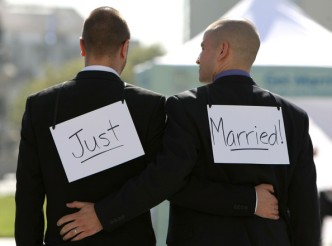
For a long time now, gay marriage has been condemned by many groups, making them a minority that is hated by people from rednecks to religious Christians. This hatred, however, can slowly evolve to become a power in court ruling. In 1986, the Boy Scouts of America created a huge controversy over gay rights. This battle has continued and as of last year, the Supreme Court ruled in favor of allowing the Boy Scouts to continue discrimination against gay men.
The woman above was recently asked to leave as a Boy Scout troop leader due to her being gay. This controversy is absurd and unconstitutional. During a previous ruling by the Supreme Court during the Loving v. Virginia case, it was stated by the court:
“Marriage is one of the “basic civil rights of man,” fundamental to our very existence and survival…. To deny this fundamental freedom on so unsupportable a basis as the racial classifications embodied in these statutes, classifications so directly subversive of the principle of equality at the heart of the Fourteenth Amendment, is surely to deprive all the State’s citizens of liberty without due process of law. The Fourteenth Amendment requires that the freedom of choice to marry not be restricted by invidious racial discrimination. Under our Constitution, the freedom to marry, or not marry, a person of another race resides with the individual and cannot be infringed by the State.”
While this may have been specific to racism in this case, the truth is that the fourteenth amendment protects all men as equal, no matter their gender, race, religion, age, or sexual orientation. Obama’s new ruling will undoubtedly become a major factor in future court cases involving the rights of gay men and women. This is why Obama’s words will make a difference.
“Which side should I support?”
Should I support gay marriage or oppose it? This is a question that President Obama has had to ask himself recently in the 2012 Presidential election. President Obama has been on the fence for the past few weeks until recently claiming he supports gay marriage, but his behavior makes me question whether his personal beliefs made the decision or whether his party’s beliefs did. Vice President Joe Biden had been known for supporting gay marriage while his president was somewhat neutral about the subject. The question that keeps re-occurring to me is; why did President Obama suddenly choose a side and how did he make his decision in such a short period of time?
Our study of parties and political outlooks this unit has helped me to answer this question. I choose to be independent meaning I don’t affiliate with either party. Like President Obama, I have not taken a side to the gay marriage battle and I simply don’t care to because it isn’t as important to me and my life as other issues that are being debated. I think President Obama may share the same beliefs as I do, but running for re-election requires him to take a side. His choice to support gay marriage has been argued to have been influenced by Vice President Biden, the homosexual liberal community, etc., but I believe it was his party’s values that chose his mind for him. Learning about judicial philosophies in Government this past week has helped me understand how presidents choose sides on an issue they seem to be indifferent about. This past week, I had to read, compare, and contrast the two main competing judicial philosophies: flexible interpretation and original intent. Flexible interpretation means the members of the judicial system honor the Constitution in a more flexible way while original intent is when the member honor the Constitution word-for-word. Although his decision had no relevance to the judicial system, the democratic party has an almost entirely liberal outlook which means flexible interpretation is used more often. Conservatives argue a man marring a man or a woman marring a woman are unconstitutional, but the democrats use flexible interpretation to make what they feel is the correct choice is today’s context and community.
President Barack Obama may have chosen the way he did for publicity or for votes, but I believe he chose the way he did to honor his party’s beliefs rather than his own. I was able to come to this conclusion from our studies of the judicial branch and how they make their decisions according to their interpretation of constitution. President Obama is using his party’s method of interpretation to choose what would attract more democrats and liberals to his beliefs gaining him more support. Also by following his party’s values, he gains support from the large homosexual community in America. Because of our judicial unit, I see why President Obama has used the liberal judicial form of making choices to make his own choices in the 2012 Presidential Election.
1 Role, 2 Roles, 3 Roles, … It’s called the President
Recently I heard about President Obama hosting the annual Easter Egg Roll as well as visiting troops in Afghanistan. From my government studies, I was able to understand these duties as three of the different roles the President holds: the Chief of State, the Commander in Chief, and the Voice of the People. Originally, I found these two events interesting because they are completely different, but they both include duties of the Chief of State. I was able to further appreciate other ways our President serves the United States.
In hosting the Annual Easter Egg Roll at the White House, the President performs his job as the Chief of State, “the living symbol of the nation.” As Chief of State, he is in charge of ceremonial events, which increase morale in the country. On April 9, 2012, Obama presided over all aspects of hosting this year’s 134th Easter Egg Roll with the theme “Let’s Go, Let’s Play, Let’s Move.” The event included family activities and the traditional egg roll on the South Lawn, as well as “educating families on smart ways to incorporate healthy eating and exercise choices into their daily routines.” In promoting healthy lifestyles, people gained a positive perception of Obama, which reflected positively on America as well. I appreciated Obama’s effort to use the opportunity to spread ideas, which will improve the quality of life for the American people. Next, I found it amusing that President Obama was even represented by a picture of his family’s dog, Bo, on the red Easter egg. In conclusion, Obama successfully performed his duties as he appeared as a remarkable President and representative of the country by hosting a day of fun and promoting healthy lifestyles.
On May 1, 2012, President Obama visited the Bagram Air Base in Afghanistan to greet the American troops and present ten Purple Hearts. In his visitation, he performed the duty of the Chief of State as well as the Commander in Chief and the Voice of the People. At this event, his duty as the Chief of State is different than when he hosted the Easter Egg Roll. In Afghanistan, he stood as an inspirational symbol of the country while he addressed the troops rather than hosting an event. The soldiers who earned the Purple Hearts held President Obama in high esteem and looked to him as the most important figure in the country. Also, by presenting awards to righteous people, other Americans wanted to gain the same honorable mention, which increases morale in the country. I value the President increasing morale because it strengthens our country’s identity. In addition, as the Commander in Chief, Obama interacted with the troops in order to evaluate strategic plans for conflict and motivate his troops to persevere, “We don’t go looking for a fight. But when we see our homeland violated, when we see our fellow citizens killed, then we understand what we have to do.” Lastly, as the Voice of the People, he gave a message of gratefulness from the people of America to the troops. Obama expressed America’s gratitude in saying,
“And so, together, you guys represent what is best in America. And you’re part of a long line of those who have worn this uniform to make sure that we are free and secure, to make sure that those of us at home have the capacity to live our lives…And I’m here to tell you, everybody in America knows that. And everybody in America appreciates it. And everybody in America honors it.”
The President is able to make speeches like these because he knows the true feelings of the people of America. Obama’s trip to Afghanistan was extremely impressive going a great distance to perform three of his roles.
Soldiers Receiving Purple Hearts
I overlooked the importance of each of the Presidents’ roles in each event until my government studies. In using the knowledge I obtained, I am able to see the significance of each action the President takes. I now see how each role represents not just the President, but also the entire country. President Obama does a great job in juggling all roles at one time and creating a fantastic identity for America. As seen in the two events, Obama is a figure for, speaks for, and gives direction for the United States of America. When throwing an event or giving a speech, he embodies the ideals of this country. While performing his roles, he is motivating, thoughtful, and insightful.
Manager for the People
As we discussed in our assignment, “Modern Presidential Roles”, according to Clinton Rossiter, the president of the United States possesses many roles and responsibilities, including those of Chief of State, Chief executive, Commander in chief of the army, chief diplomat, chief legislator, chief of party, voice of the people, protector of the peace, manager of prosperity, and world leader. Among these, is an important, yet controversial role, the “manager of prosperity”. With today’s current economic crisis, questions arise about what the extent of a president’s action should be in order to maintain a capitalist society and democracy. So, how does this affect voting? People of the United States will vote for the candidate whom they think will be the best leader of the nation and the best manager of the economy. And, today, there is a current argument that the Republican candidate, Mitt Romney, is not capable of managing the prosperity of the nation because of his personal socioeconomic status.
Yes, many voters today do believe that Obama should be the next president due to the proposed incapability of Mitt Romney to command the economy. Mitt Romney, as stated in many news casts, such as that of USA Today, “The former Massachusetts governor, has disclosed only the broad outlines of his wealth, putting it somewhere from $190 million to $250 million”, which, makes him about “50 times richer than Obama” (1). Thus, this may cause a particular problem with voters. Having a candidate with this vast amount of money, many would doubt his concept of the dollar and his ability to ascertain the value of money. To him, $10,000 dollars is just a sum, with smaller value, but, to many citizens of America, this amount of money is very significant and most likely more than they will ever see. According to a Gallup poll, “Fifty percent of Americans say they have a great deal or a fair amount of confidence in President Barack Obama to do the right thing for the economy or to recommend the right thing for the economy, while only 42 percent say that about Republican presidential candidate Mitt Romney”. Thus, Americans are more trusting of the democratic candidate than the republican one.
This situation, however, is even more significant due to our current, insurmountable economic debt. Our government is drowning in debt, with around 15,700,000,000,000 stacking high on our dues. With all of this, our nation has our economic situation as a priority in their minds, and, therefore, this crisis will heavily affect the voters’ decisions. The people of America have two “modern presidential roles” in mind when they are making their decision as to who the president should be: the “manager of prosperity” and the “voice of the people”. The American people want a president that can best relate to their needs in the economy, and, with the great wealth of Mitt Romney, it is likely many citizens would choose Obama for this role. They also want someone who would vie for their needs economically, one who is indicative of the greater population of the United States, and would be their “spokesman” of economic standards. In accordance with these “modern presidential roles”, it is predicted that in the area of economic development, Barack Obama is the preferred candidate.
Who can get More Dirt on Who?
This year in government we have studied election and how people campaign. Campaign videos have become a big thing that can help a candidate gain votes. Earlier this year we did an activity where we had to watch campaign videos and identify the tone, argument, and emotional appeal. Through watching these videos I realized that videos can have a big impact on a campaign and how the voter feels. These videos added insight to how a video can greatly affect a voter. For example the “Prouder, Stronger, Better” add by Ronald Reagan was a great video because it made you feel like he made America great and after that video I found myself thinking I would have voted for him if i was alive then. The video below shows what a great campaign video looks like and why great videos can change thoughts about someone. 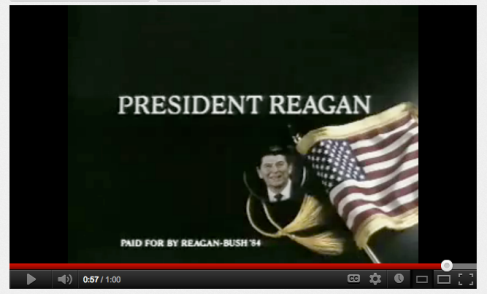
After studying these videos I realized that they have a great impact on what people think about that person as a candidate. While the video above is a great video and shows so many reasons why Ronald Reagan would be a great president not all videos today follow that path. Today the elections and campaigning is all about who can dig up more dirt on who and make the other candidate look bad to the public. It has almost become something of which people want to make there appearance better to the public than their opposition. The fact is that politics has become dirty and been made into something that it wasn’t in the past. 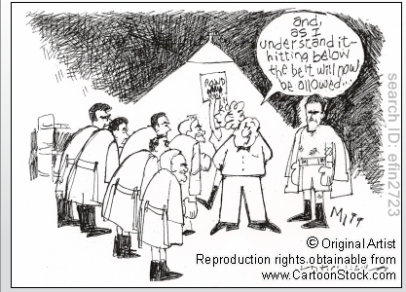 When one starts to run for office it is almost as if he must know that sometime during his campaign his opposition will or will try to bring out something dirt about him and try to hurt his campaign.
When one starts to run for office it is almost as if he must know that sometime during his campaign his opposition will or will try to bring out something dirt about him and try to hurt his campaign.
An example that has just come out recently is how President Obama released a six minute video on the internet talking about all the bad things the Mitt Romney has done in his business days. There is also a shorter television version of the video that will be showed in the states of Ohio, Pennsylvania, Virginia, Iowa, and Colorado all of which are considered swing states.  This video was released to try to sway votes toward Obama by making Romney look bad in the process. In this video it is talked about how Romney costed many people their jobs for his own personal gain but what they leave out it Mitt Romney’s side of the story. Mitt Romney states that he was not in charge of this because he was in charge of the Olympic Committee. This video is a clear stab at Mitt Romney trying to gain more votes for Obama. This is a dirt way to gain votes and in my opinion does not reflect well upon Obama.
This video was released to try to sway votes toward Obama by making Romney look bad in the process. In this video it is talked about how Romney costed many people their jobs for his own personal gain but what they leave out it Mitt Romney’s side of the story. Mitt Romney states that he was not in charge of this because he was in charge of the Olympic Committee. This video is a clear stab at Mitt Romney trying to gain more votes for Obama. This is a dirt way to gain votes and in my opinion does not reflect well upon Obama.
This video is discussed in an article in USA Today where they talked about how it was a dirty video from Obama. While I agree that this video is very dirty and wasn’t needed I will say that I know that both sides in campaigns play dirty. Mitt Romney is probably guilty of some dirty advertising as well but in my opinion I think that both sides should cut it out. No one likes people who play dirty and so I personally think that people should play fair and cut out all of this “Dirty play”. What we need is everyone to go back to to advertising like Ronald Reagan. His video “Prouder, Stronger, Better” was a great example of how to campaign and people need to model after that from now on.
The 2012 Election
The current event related to class that I better understand because of our studies in class is the 2012 Presidential Election. Before our study of elections, I did not follow the elections very closely and did not really understand how the election process worked. “Elections” was our fourth unit in our study of government.
We looked at different aspects of the election process, including the Electoral College, Voter Participation, and the influence of money in elections. My favorite activity, and most relevant to the current election,was “Campaign Commercials.” We looked at different campaign commercials throughout history and compared them to current ones we see on TV today. An example of a current ad that we watched and analyzed was President Obama’s “Yes We Can” commercial from 2008.
In order to analyze the effectiveness of the commercials, we considered the following: emotional appeal, target audience, central issue, and credibility. We even had our own presidential elections in our classes. We wrote policy briefs to let the “voters” know where we stand on issues, such as energy, education, healthcare, and social issues such as same-sex marriage and abortion. We used different types of media, such a social networks, websites, and commercials just like current presidential candidates. We created a campaign commercial.
We also created a website and Twitter, just like a modern presidential candidate to understand what must go into making a campaign for president.
We were encouraged to keep up with the election and follow who remained in and dropped out of the GOP election. We followed Herman Cain, Newt Gingrich, Jon Huntsman, Thaddeus McCotter, Tim Pawlenty, Rick Perry, and Rick Santorum as they dropped out of the election. We also followed candidates who remain in the GOP election, including Mitt Romney, and Ron Paul.
Through our “Elections” unit, I feel as though I much better understand the election process. Since I will be eligible to vote in this election, I feel that it is important for me to keep current with the election, so that I can make an informed decision come November.
Obama’s Informal Support
Some social issues seem almost unresolvable. Unlike its clearly defined roles in straight-forward political issues, the U.S. government’s involvement with social choices has always been ambiguous. Even the smallest of social choices, it seems, can be debated as constitutional or unconstitutional. For this reason, gay-marriage is a frequently debated subject. So, when a new development occurs that changes the political landscape on this issue, it has tremendous importance to many citizens who are tired of the persistent nature of this debate. On Wednesday, May 9th, 2012, President Barack Obama announced his personal opinion on the matter. Having been a supporter of civil unions originally, Obama stated that his views were, “evolving,” and that he now is a public advocate of gay-marriage. Though his statement represented only his personal belief, this will have major political impact in both the president’s current term and his upcoming election. Obama’s voiced opinion is also a great example of how a president uses his or her power. This informal tool helps to depict how the president himself views his role as a leader. President Obama has voiced a personal opinion on a frequently-debated subject, and has demonstrated his control over the powers that a president holds.
The main reason as to why this debate persists is due to the ambiguous nature of the constitution’s coverage of this issue. Of course, the issue is not named specifically, so any arguments for, or against, gay-marriage must be inferred. People supporting gay-marriage look to the Equal Protection Clause and the Due Process Clause of the constitution to support their argument. They assert that homosexuals are not being treated with equal protection of the law and are being dealt with unfairly. The opposition look for a concrete definition of marriage and some believe it is solely between a man and a woman. Either way, this issue has always been a state-level concern. With President Obama’s support, the issue may now be a federal concern.
The manner in which the President shared his opinion is important as well. His announcement to the public, which can also be called “going public”, is a powerful informal tool of a president. New tools have allowed the president to persuade the public and members of congress in ways that have never been explored. Obama announced his opinion, for example, on television, but the announcement has spread like wildfire through the internet and is the subject for many radio programs. Virtually any source of media has given the president a new route for winning the public’s hearts, with the main goal of persuasion. Simply with this informal tool, the president has made an issue relevant and important, and put some building pressure between him and any congressman who would oppose the president if this issue was brought up for federal legislation.
It is astonishing that Neustadt’s Presidential Power and the Modern Presidents: The Politics of Leadership, a book written in 1960, can hold so much political relevance today. Obama, modern presidents before him, and assuredly future presidents will all use these formal and informal tactics to achieve political persuasion. Even with an issue as difficult to solve as gay-marriage, informal powers of the president might just create enough pressure or gain enough support to solve the problem.
-Paxton S
Will Gay Marriage Haunt Obama?
 In Government class this year, at several times we have compared what we have been learning in class to current events stories. We have related these stories in ways to topical debates, papers, reflections, and ext.
In Government class this year, at several times we have compared what we have been learning in class to current events stories. We have related these stories in ways to topical debates, papers, reflections, and ext.
President Obama over the last year and a half has gotten himself into a pretzel over weather or not to support gay marriage. Whichever side Obama chooses to take on this issue could damage his popularity among his supporters. The reasoning behind this is that his coalition is made up mainly of young voters and minority voters. If we go back to the Proposition 8 vote in California in 2008 we can see that 70% of African Americans voted to ban gay marriage in California however 50% of the other half of his supporters voted to allow gay marriage. The opposing viewpoints of President Obama’s main two supporting groups, leaves him in a difficult spot to saw what side he supports. In a study done by the Washington Post one – in – six of President Obama’s big “bundlers” are gay, therefore taking a side on same sex marriage could not only lose him voters and supporters but also take away vital campaign money.
 If the President of the United States doesn’t take a side on weather he supports gay marriage, why do gays and lesbians continue to support is campaign? Many political annalists believe it is because they are thinking that since he hasn’t taken a side on it, that if he is elected to a second term as President he will state his side, as same sex marriage should be allowed. One reason that this could be is, he hasn’t taken a side on the argument because he believes that he can make it through the election without doing so and not lose as many supports as he would by choosing a side. This approach was working for him until last week when Vice President Joe Biden stated that he was for same sex marriage. Joe Biden taking this side has made it difficult for the White House to defend that President Obama hasn’t taken a side and that Biden’s words were misinterpreted.
If the President of the United States doesn’t take a side on weather he supports gay marriage, why do gays and lesbians continue to support is campaign? Many political annalists believe it is because they are thinking that since he hasn’t taken a side on it, that if he is elected to a second term as President he will state his side, as same sex marriage should be allowed. One reason that this could be is, he hasn’t taken a side on the argument because he believes that he can make it through the election without doing so and not lose as many supports as he would by choosing a side. This approach was working for him until last week when Vice President Joe Biden stated that he was for same sex marriage. Joe Biden taking this side has made it difficult for the White House to defend that President Obama hasn’t taken a side and that Biden’s words were misinterpreted.
Without studying the Government of the United States this year, I wouldn’t fully understand the reasoning behind president Obama not taking a side on the issue. Now after studying the process of elections I understand that if he takes one side he could lose some supporters and if he chooses to the other way he could lose less supporters but more campaign money, which is greatly needed in his reelection campaign. By learning about the importance of every dollar earned and every vote you can earn being of such importance I fully understand now how it is such a set back for Vice President Joe Biden to have taken a side when Obama was trying to keep everyone happy and stay undecided until after hopefully earning reelection.
You can find a video from top line here
That’s Great President Obama… But When Will Gay Marriage Be Legal?
Today President Obama finally took a stance on same sex marriages. He stated that he personally believes that gays and lesbians should have the right to get married, even though when he was running for office in 2008, he was against same sex marriages but for civil unions. Whether or not gay marriage will be allowed by all the states in the near future is irrelevant; what really matters is that someone in power finally took a firm stance on one side of the issue. Typically, politicians tend to avoid controversial and sensitive social issues in order to avoid stepping on certain people’s toes. However, America is becoming a more open place, and it’s about time for people to start talking about these issues that used to only be talked about behind closed doors.
When it comes to actually implementing gay marriage policies, there is usually some trouble. The constitution does not directly address social issues, let alone gay marriage, so there is a lot of room for debate on any social issue. The constitution does not explicitly say “Gay marriage is ok” but it also does not say “Gay marriage is illegal” or “Gay marriage threatens our democratic ideals”. So when debating gay marriage, it really comes down to how someone interprets the constitution. Whether or not someone uses the Whig model or the Stewardship model will play a part in determining whether or not they believe gay marriage is constitutional or not.
There are also other factors that contribute to any policies made regarding gay marriage. In the status quo of the United States, decisions fall to the individual states regarding gay marriage according to the constitution. Even though President Obama did say he is for same sex marriages, that won’t be enough to change anything because the responsibility of making laws regarding gay marriage falls to the states, and because of the fact that the President does not have ultimate power to make any decision they want. Even if the federal government had the power to make gay marriages legal, the executive and the legislative branches would still have to be able to agree on the issue and enough people would have to want to legalize gay marriage.
 While yes, it is great that President Obama can talk openly about his opinions regarding gay marriage, this does not mean that same sex marriages will be legal across America in the near future. In this case, personal opinion does not matter, because in order for gay marriage to be legal across America, many policy hurdles have to be overcome. In reality, same sex marriage will probably not be legal in America for a very long time. However, as a country we are making progress considering people are getting comfortable enough to discuss controversial social issues in public, and for now, that will have to be good enough.
While yes, it is great that President Obama can talk openly about his opinions regarding gay marriage, this does not mean that same sex marriages will be legal across America in the near future. In this case, personal opinion does not matter, because in order for gay marriage to be legal across America, many policy hurdles have to be overcome. In reality, same sex marriage will probably not be legal in America for a very long time. However, as a country we are making progress considering people are getting comfortable enough to discuss controversial social issues in public, and for now, that will have to be good enough.
Presidential Power: Is it saving lives?
Arriving home each day from school to TV shows like Rachel Maddow Show and The Colbert Report had never really interested me before taking 11th grade government. I now find myself sitting down with my family and taking the time to watch these shows and I have finally realized that I truly understand what these popular Television faces are discussing. One of the main topics that I have been seeing discussed on national television is obviously the 2012 Election. And although I am just short of being old enough to vote in it, I feel as if I may be more qualified than many adults to take part in this election all thanks to my Government class. Opinions on taxes, war, healthcare, and marriage rights are all very crucial during this election but the topics of healthcare and gay rights stand out to me most.
I will not be able to participate in the upcoming election by voting, but I do believe that I can still make an impact by voicing my opinions. I am very passionate about the issue on Same-Sex marriage and take every opportunity I get to express my beliefs. By taking this course I have learned so much about how the election process works, I was able to understand the Primary and Caucus systems which have now lead into the process of gaining delegates. Using interactive websites during class helped me learn the material in an interesting way.
Presidential power was a topic we discussed that really impacted me. Presidents should be able to make changes and not be limited by documents written over 200 years ago. Franklin Delano Roosevelt first began thinking this way. His modern way of thinking was to benefit America in the times of change and while technology was growing. Now moving into the 21st century, times have changed since the Constitution was written. America is not the same today and in order to make changes, the President needs to be able to stray from the norms in the 1800s and make decisions that benefit America today in the 2000s. While the Constitution is a very important document and should always remain the center of thinking for our government, a new point of view on it and a little more elbow room in the interpretation should be able to take place in order to help America grow.
For Barack Obama, this elbow room in power took place in his healthcare system. While it wasn’t the most popular and still is not today, he did not overstep his constitutional rights but still took control in shaping America how he saw most fit. Today, his policy is helping American’s tremendously. Sahil Kapur from TPM points out that Obamacare has saved senior citizens 3.4 billion dollars in their prescription drug costs. During this time of technological advances where medical advances are being made at high costs, the President was able to use his power to help citizens obtain these live saving and prolonging goods.
Obama’s healthcare will give back $1.3 billion to American’s and companies giving back to the economy says The LA Times. Obama’s healthcare system helps relieve the cost of hospital and medical fees by spreading the cost of insurance more equally between all Americans. Elise Viebeck of The Hill Online explains how because of his new laws over 200 local clinics have been updated with more modern equipment and up to 1.3 million American’s will be able to use local healthcare to its fullest.
Money’s Influence on Elections
Money’s influence on the election process has increased due to social media and the availability of advertisements for campaigning. In the 60’s it was common for a successful House candidate to spend less than 100,000, but by 2008, the average cost of winning a seat in the House topped 1.4 million. Buying advertisements has been the primary resource for spending money to reach out and influence voters, so the person with the most advertisements and the most successful ads, will have the greatest touch on the voters opinion.
In our work in government class we discussed the pros and cons of the influence of the money in politics. The amount of money being spent for each candidate increases every election with few exceptions. Most would say that the increasing influence of money is a great thing because it allows for more to be informed of the views of the politicians, but I would say it is a disadvantage.

Government has tried to control the raging flow of money in elections by limiting candidates to amounts of money they are allowed to spend. This isn’t such a bad idea because of the downsides of allowing the rich to spend as much they want to get their voiced opinions out to the public, giving the poor a lesser chance of winning power. If a rich man was allowed to spend all of his money, he would have access to more of the public and have more of an advantage over the poor man. Since the man with the less money has insufficient funds to spend on advertisements, he must work harder to have any voice at all in his efforts to campaign.
In the senate and house, the money plays a major role in who is elected or reelected. When an incumbent, someone running for reelection, is in the race for reelection, they have an an advantage in raising money for their campaign. The challengers raise about half the amount of money the incumbent did in total, and there are fewer incumbents then there are challengers. The trust built or lost in the incumbent’s influences the amount of money they are able to raise and if there is a sufficient amount of money raised then their reelection is pretty much guaranteed.

The 2008 Presidential election was predicted to be the “1-billion dollar election”. It was also thought to be the most expensive and longest election in American history. The candidate with the most money was guaranteed presidency. Barack Obama spent more than 747.8 million dollars in his campaigning, which happened to be 400 million dollars more than his leading competitor, John McCain. The reason for the vast amount of spending was because it was the first open seat in this generation, because of the state of the economy and the war in Iraq. The candidates that had no shot at presidency were the candidates with little money to spend in comparison to the leading competitors
Tweeting His Way to the Top
According to our Founding Fathers, the presidency is primarily a check on the powers of the other two branches of government and the military. The first clause of article two of the Constitution declares “the executive Power shall be vested in a President of the United States of America.” They assigned the role of the president to be the head of the executive branch, not the sole leader of our country. So, if the Constitution does not give presidents as much power as they seem to have, then how have they become such central figures in American government?
In class, we have recently discussed Richard Neustadt’s idea of presidential informal power. In the White House, Neustadt argues “[The President’s] strength or weakness, then, turns on his personal capacity to influence the conduct of the men who make up government.” Essentially, modern presidents derive their power from their ability to influence others, particularly politicians, rather than directly from the Constitution. In today’s modern world of technology, the Internet has become an essential part in a president’s informal power. For example, President Obama uses social media sites as an outlet to impose his beliefs among people around the nation, specifically Twitter.
Twitter is growing in numbers everyday; since its debut in 2006, over 175 million users have joined in the tweeting, re-tweeting, following and favoriting (http://www.technolog.msnbc.msn.com/technology/technolog/just-how-many-active-twitter-users-are-there-124121). Our government class has been using Twitter along with millions of people in order to discuss and learn about political processes and recent happenings in the 2012 election. We can even view the tweets of prominent politicians, including President Obama along with a team of tweeters that help manage his account. Through his Twitter account, President Obama is able to practice his informal strength by promoting his campaign, success and ideas in a variety of tweets. To follow the President on Twitter, click the following link: http://twitter.com/#!/BARACKOBAMA.
Obama’s followers can find any information about the President and his campaign simply by viewing his tweets. Looking at the most recent tweet from the four above, Obama tweets often to let his followers know how they can get involved in his campaign, for example linking them to sign up sites for his campaign rallies. By gathering more supporters via Twitter, Obama’s capacity to influence, or his informal power, grows even larger.
In the second most recent tweet, Obama posted about the newfound success of Chrysler, a business that found its way during his time as President. When any American business improves, regardless of its importance, it indicates economic growth. Obama tweeting about the minor growth of success in America on his hand may positively impact people’s impression of President Obama. Without expressly writing that the American economy is improving on his watch, he still allows people to think that perhaps he is helping its growth with small steps.
Often times, politicians use Twitter to criticize policies and proposals of other politicians, and this can certainly get heated in the midst of a Presidential Election. Becuase Mitt Romney will most likely pull ahead as the final GOP candidate, he is Obama’s direct target in attack campaign videos, ads and tweets. Twitter is an ideal form of attack, simply because he can link out to videos or external links that support his reasoning as to why Romney is the wrong choice, and millions will see it. However, Obama must keep in mind that negative publicity will also come his way from other candidates. Attacks can be very harsh, but it’s all part of politics.
Finally, Obama is able to directly interact with American citizens and gather their opinions on new bills and policies through Twitter. He can summarize it in a brief tweet and watch the replies roll in, collecting immediate feedback in order to give Americans precisely what they want.
Many of Obama’s critics say that he is far too wrapped up in media involvement, and that it has resulted in an unfair balance of coverage between him and other Republican candidates in the 2012 election. However, why would the President not use this deemed “love affair” to his advantage? If he is able to ramp up his power through the Internet, or even the television and radio, why wouldn’t he seize the opportunity to do so? Modern times call for a change in political approach; it is an undeniable fact that the media now plays a large role in politics. If the media wants to follow President Obama around while he has them wrapped around his finger, he should continue to utilize his power over media in order to display his informal powers.
The ability to use sites like Twitter in order to hype up presidential informal powers of influence and persuasion has made a tremendous impact politics, and should certainly call for an interesting 2012 Presidential Election. President Obama will continue to use Twitter as an avenue to connect to citizens, gather support and possibly influence people to see his side of things. I personally believe that Twitter is an excellent way to share and spread ideas considering the Internet is one of, if not the primary form of communication today. We must share ideas to keep the general community informed of important news, interesting articles and controversial moments in the world, and it’s easy to share things on Twitter. After all, very powerful things can be stated in a mere 140 characters or less.
How Far Will They Go?: Manipulation in the 2012 Election
Studying campaign commercials this trimester really peaked my interest. In a world where technology rules, media is extremely important. For an election, media is even more important because it can make a candidate look great or make their supporters doubt whether they still intend on being a supporter. Campaign commercials and other types of media have always been crucial within the election, but in recent years, since technology has become more relevant, these commercials have gained so much power that they could potentially make or break a candidate’s career. In the 2012 election, vital candidates such as Obama, Romney, Santorum, and Gingrich have used the power in the media to bring themselves up while tearing their opponents down. This, in theory, seems be fine, it’s a competition after all, but the way that some candidates do this is by manipulation. Candidates can manipulate in many ways, but, ultimately, there are two ways of manipulating in the media: twisting around and placing opponents’ words into different context and omission.
The first way of manipulation in the media is twisting around the words of opponents and placing them into different context. Basically, candidates will take a piece of what an opponent said and use it to their advantage. An example of this is Mitt Romney twisting around the words of Barack Obama saying, “If we keep talking about the economy, we’re going to lose”. Romney is attempting to manipulate the citizens of New Hampshire by saying that Obama was “trying to distract us from what matters” (http://adage.com/article/campaign-trail/mitt-romney-ad-twists-obama-s-words-works/231147/). Later, it was discovered that Obama was actually quoting John McCain. Romney took this quote completely out of context because the actual quote by Obama was, “Senator McCain’s campaign actually said, and I quote, ‘If we keep talking about the economy, we’re going to lose’”. The problem with this, besides the obvious twisting of words, is that the public is not going to go look back on each quote by each candidate, they are just going to hear what they want to hear and believe what they want to believe. Romney’s manipulation here may have actually played a part in helping him become the front-runner of the Republican Party.
An example of omitting the complete truth is Rick Santorum’s campaign commercial that seems to be about Obama and his faults but ends up being about Romney and his. The narrator says that Romney’s “big government-mandating health care included $50 abortions”. This is referring to the state health care law signed by Romney. It said nothing about abortion when he signed it. Later the Commonwealth Connector was forced, by a Supreme Court ruling in 1981 that “women eligible for Medicaid had a state constitutional right to payments for medically necessary abortions” (http://factcheck.org/2012/04/deja-vu-the-latest-attacks-from-santorum/). Again in 1997, the state high court ruled that Massachusetts “must cover medically necessary abortions if it covers other medically necessary care, such as childbirth”. Later, the ad claims that Romney “supported radical environmental job-killing cap and trade”. Many years ago, when Romney was governor of Massachusetts, he had the idea of a regional cap-and-trade system for the Northeast, but then decided to drop the idea completely. Romney clears up the situation by saying that he does not believe in the cap-and-trade program, that it doesn’t make sense for Americans to “spend trillions of dollars to somehow stop global warming”. He said that Americans will lose jobs and that it just wouldn’t be successful because “energy intensive” industries will “just get up and go somewhere else”. But, again, this manipulation in the media completely threw everyone into frenzy, causing them to look away from one candidate and into the dirty little secrets of others.
The easy-access to media has completely changed all presidential campaigns. Because of this easy-access, candidates have been forced to take media and tend it to their needs. Candidates have been forced to use the media in any and all ways that help their campaign. To do this, some candidates turn to the positives aspects of themselves, but, more often than not, candidates use the media to show a negative side to their opponents, and when there isn’t a negative side, or they cant find it; they will turn to lying as a way to make sure that there is a negative aspect. They know it will be seen as negative because they, basically, created it themselves by molding it and warping the truth to look and sound the way that they want it to.
Wondering how much of what you hear is true? Check out factcheck.org!
